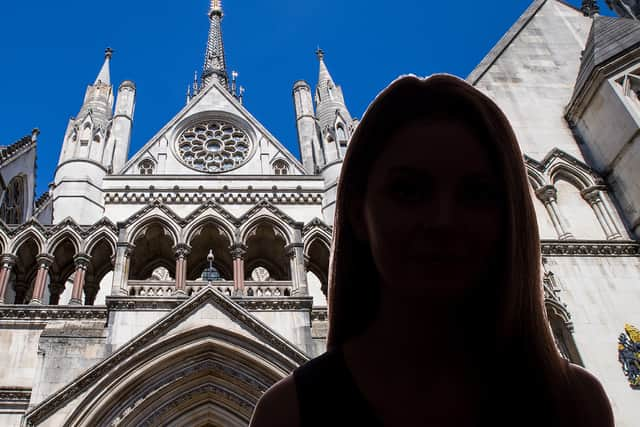Woman jailed for illegal lockdown abortion to be released from prison after Court of Appeal ruling
and live on Freeview channel 276
A woman in England who was jailed for illegally aborting her pregnancy during the first coronavirus lockdown has been released after the Court of Appeal reduced her sentence.
The woman, whom NationalWorld has chosen not to name, pleaded guilty earlier this year to ‘procuring an illegal abortion’ under the 1861 Offences Against the Person Act - which carries a maximum penalty of life in prison. In June, she was sentenced to 28 months in what Mr Justice Pepperall described as a “tragic” case, but on Tuesday (18 July), three judges reduced her jail time during a Court of Appeal hearing in London.
Advertisement
Hide AdAdvertisement
Hide AdDame Victoria Sharp, sitting with Lord Justice Holroyde and Mrs Justice Lambert, said the case was “very sad”, and one which “calls for compassion, not punishment.” She added that there was “no useful purpose served by detaining [the woman]”, and ruled that the sentence be reduced to a 14 month ‘suspended’ one - meaning the woman will be released from prison.
During her sentencing at Stoke-on-Trent Crown Court, the woman, who already has other children, wept in the dock as Robert Price, prosecuting, made his statements. He told the court that she had lied to the British Pregnancy Advisory Service (BPAS) – a legitimate abortion provider – to obtain abortive medicine in May 2020.
Mr Price said the woman had concealed how far along her pregnancy was to BPAS, and that internet searches about how to induce a miscarriage demonstrated she knew she was past the 24-week legal limit for abortions. He added that BPAS believed her to be under eight weeks pregnant, and had provided the pills under an emergency law passed during lockdown which allowed abortion care to be provided remotely for women under 10 weeks pregnant.
Mitigating, Barry White, described how the woman - who still requires support from mental health services three years on from the abortion - had been in “turmoil” and in a “dark and difficult place” when she tried to decide what to do. Her remorse and guilt about the abortion had been evidence since and she continued to be plagued by nightmares and a deep emotional attachment to the child, he added, stating: “It will haunt her forever.”
Advertisement
Hide AdAdvertisement
Hide Ad

Mr White also spoke of the “unprecedented struggle that developed in this case”, pointing to how normal in-person services that may have been available to help a woman in her position unavailable as a result of the pandemic.
He then told the court of how the woman’s relationship with the baby’s father had ended, and she had returned home to a “failed relationship” so that her existing children could have contact with both their parents during the lockdown. She did not want this partner to know that she was pregnant by another man, he added.
Paramedics were called to the woman’s home in 2020 after she delivered a stillborn foetus which was later estimated to have been between 32 and 34 weeks gestation. The woman told paramedics she believed she had had a miscarriage late in 2019, and was no longer pregnant, but that her “tummy had continued to grow”.
Resucitation attempts were made on the foetus by the woman’s then-partner, and later by paramedics, but they were unsuccessful. Subsequently, a pathologist ruled that there was no evidence the foetus had ever taken a natural breath, concluding it had died “at or around the time of delivery”.
Advertisement
Hide AdAdvertisement
Hide AdFollowing the Court of Appeal’s decision, Clare Murphy, chief executive of BPAS, said: “We echo the judges’ statements that this is a case that calls for compassion, not punishment, and are delighted with the decision to release [the woman] from prison.
“The Court of Appeal has today recognised that this cruel, antiquated law does not reflect the values of society today. Now is the time to reform abortion law so that no more women are unjustly criminalised for taking desperate actions at a desperate time in their lives.
“Two women accused of illegally ending their own pregnancies are currently awaiting trial. We urge Parliament to take action and decriminalise abortion as a matter of urgency so that no more women have to endure the threat of prosecution and imprisonment.”
A spokesperson for Level Up, a “a feminist community campaigning for gender justice in the UK”, added: “Like thousands of mothers in Britain, [this woman] was sent to prison and separated from her children for something that should never have put her there. This case must bring renewed calls to fight the criminalisation of abortion – and of women and mothers more broadly.
Advertisement
Hide AdAdvertisement
Hide Ad“While we are delighted that [this woman] has been released from prison, she should have never been put there in the first place. Existing sentencing guidelines for judges already state that they should be taking a mother’s primary caring responsibilities – and the impact of a sentence on her children – into consideration.”
The woman in this case had written letters to her existing children explaining what she had done in case she did not return from court on the day of her sentencing. White, mitigating, asked the judge to consider imposing a suspended sentence rather than immediate custody to avoid a detrimental impact on the woman’s family.
At the time, Mr Justice Pepperal said that while he accepted the woman felt “deep and genuine remorse” and had been in “emotional turmoil” at the time of the abortion, he could not impose a suspended sentence because she had not pleaded guilty at the earliest opportunity. The fact she had not done this was one of “the many tragedies in this case”, he said.
But on Tuesday (18 July), Dame Victoria argued there was “exceptionally strong mitigation” in this case, and that the woman should be released from prison “immediately”.
